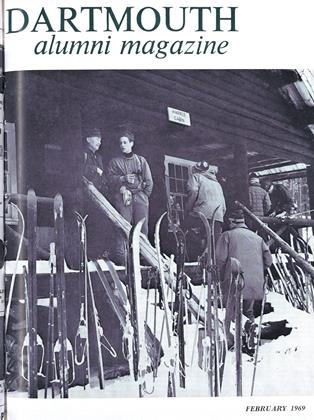YOUR SON, CALVIN COOLIDGE A SELECTION OF LETTERS FROM CALVIN COOLIDGE TO HIS FATHER.
FEBRUARY 1969 WILLIAM J. BRYANT '25YOUR SON, CALVIN COOLIDGE A SELECTION OF LETTERS FROM CALVIN COOLIDGE TO HIS FATHER. WILLIAM J. BRYANT '25 FEBRUARY 1969
Edited by Edward Connery Lalhem '51.With an introduction by John Coolidge.Montpelier: Vermont Historical Society,1968. 243 pp. $8.95.
For these important letters we are beholden to Major John Coolidge, the owner, for permitting publication and to Mr. Lathem, Dartmouth College Librarian, for years of painstaking research and wise choices from voluminous material. Particularly valuable are his interesting and extensive supplementary notes. His definitive book makes accessible valuable information for future historians.
Letter after letter shows Calvin Coolidge's philosophy based on old-fashioned virtues of honesty, thrift, and industriousness, which, illustrated by his conduct in public office, were often misunderstood and even deplored.
The debt to his father for upbringing and education is often reflected in the constant urging that the father visit Northampton, Boston, and Washington to witness the honors being showered on the son. But the Colonel was reluctant to leave the unhurried simplicity of Vermont hills, and his visits to the centers of power were rare. The father's pride in his illustrious son is indicated by the way he carefully treasured his letters. The father's have not survived, but the son's adequately reveal the quality of the relationship and will form almost certainly the basis for many scholarly interpretative studies of the career leading to the Presidency.
The letters suggest Calvin Coolidge's secret as a successful vote-getter among various ethnic groups. He made no unrealistic promises and constantly proved by honest and unpretentious effort that he was working for the interests of all. Perhaps in these days of obligatory TV glamor Coolidge would have been less successful, but his lack of histrionic flair fitted the times.
Calvin's simple statement to his father in 1924 that he hoped never again to endure the rigors of running for public office should settle the controversy created by his sensational avowal in 1927 that he "did not choose to run." As a boy and young man he was frail, and little doubt exists that the pressures of the Presidency were underlying causes for his premature death at the age of 61.
These letters confirm much that one knows of Coolidge: his taciturnity, formal relations with his fellow human beings, and direct approach. I myself had a disconcerting experience in the autumn of 1922. Vice President Coolidge was attending a Republican regional meeting in Hanover. Governor James Hartness of Vermont arranged for me to interview Mr. Coolidge for TheDartmouth by riding with him and his father from Webster Hall where he had addressed the student body to the Phi Gamma Delta House reception. He did not make me feel particularly at ease by addressing me, an undergraduate, as Mr. Bryant. Although I questioned him rapidly on current problems, I could elicit from him no statement worth printing. To my question, "Would you advise a young man to go into politics?" he replied, "I would, and I wouldn't."
But I myself knew that the future President of the United States had a lighter side, for in early years Calvin had told us that his father could touch the end of his nose with his tongue.
A Vermonter, Mr. Bryant for many yearshas been fascinated by Coolidge and his career in and out of the White House.
 View Full Issue
View Full Issue
More From This Issue
-
 Feature
FeatureTHE UNSUNG HERO OF THE DARTMOUTH COLLEGE CASE
February 1969 By Susan Liddicoat -
 Feature
FeatureThe Bearing of the Green
February 1969 By Mary B. Ross ('38) -
 Feature
FeatureA Call for Equal Opportunity
February 1969 -
 Feature
FeatureA Student View of the Crisis, 1816-19
February 1969 -
 Article
ArticleTrustees and Alumni Council Meet
February 1969 -
 Article
ArticleThe Undergraduate Chair
February 1969 By CHRIS KERN '69







